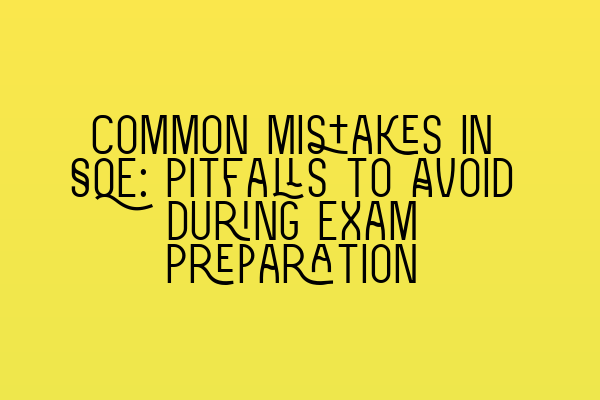Common Mistakes in SQE: Pitfalls to Avoid during Exam Preparation
Gaining admission to the legal profession in the UK requires passing the Solicitors Qualifying Examination (SQE). As aspiring solicitors prepare for this important exam, they often encounter various challenges and pitfalls. To help you navigate the exam preparation process more effectively, we have compiled a list of common mistakes to avoid. By steering clear of these pitfalls, you can optimize your chances of success in the SQE.
1. Lack of Structured Study Plan
One of the most common mistakes made by aspiring solicitors is approaching SQE preparation without a well-structured study plan. Without a clear roadmap, it is easy to become overwhelmed and waste time on ineffective study methods. To avoid this pitfall, develop a comprehensive study schedule that covers all areas of the exam and create realistic study goals.
2. Neglecting the Importance of Practice Questions
Simply reading textbooks and study materials is not enough to effectively prepare for the SQE. Many candidates make the mistake of neglecting practice questions, which are crucial for familiarizing yourself with the exam format and developing the necessary skills. Incorporate regular practice question sessions into your study plan to assess your understanding and identify areas that require improvement.
3. Failing to Prioritize Revision
Revision is a crucial component of exam preparation, yet many candidates fail to prioritize it. Instead, they spend an excessive amount of time on initial studying, leaving little time for consolidation and review. Make sure to allocate ample time for revision, as it allows you to reinforce your knowledge, identify weak areas, and refine your understanding of key concepts.
4. Overlooking the Importance of Legal Skills
While legal knowledge is undoubtedly important, many candidates overlook the significance of developing legal skills. The SQE assesses not only your knowledge but also your ability to apply that knowledge in practical scenarios. To avoid this mistake, engage in activities that enhance your legal skills, such as drafting practice, legal research, and mock client interviews, to ensure a well-rounded preparation.
5. Neglecting Mental and Physical Well-being
Exam preparation can be mentally and physically demanding, and neglecting your well-being can seriously impact your performance. Many candidates make the mistake of disregarding self-care during the preparation period. Remember to prioritize adequate sleep, exercise, and a healthy diet to maintain optimal mental and physical health. Don’t be afraid to take breaks and engage in activities that help you relax and recharge, as it will ultimately enhance your concentration and productivity.
6. Over-Reliance on One Source of Study Material
Relying solely on one study material or resource can be a risky strategy. While it may be tempting to rely on a familiar textbook or a single online resource, doing so can limit your exposure to different perspectives, explanations, and question styles. To broaden your understanding and increase your chances of success, explore various study materials, resources, and sample questions that align with the SQE syllabus.
7. Procrastination and Time Mismanagement
Procrastination is a common pitfall that can significantly hinder your SQE preparation. Waiting until the last minute to begin studying or failing to manage your time effectively can lead to unnecessary stress and suboptimal results. To avoid this mistake, prioritize your tasks, set realistic deadlines, and develop effective time management strategies that work for you.
8. Underestimating the Importance of Exam Techniques
Effective exam techniques are critical for performing well in the SQE. Many candidates make the mistake of solely focusing on content knowledge without dedicating sufficient time to mastering exam techniques, such as time management, question analysis, and writing skills. Familiarize yourself with the exam format and practice specific techniques to enhance your performance on the day of the exam.
Conclusion
As you embark on your SQE exam preparation journey, try to avoid these common mistakes that many candidates fall victim to. By developing a structured study plan, prioritizing practice questions and revision, focusing on legal skills, maintaining your well-being, diversifying your study resources, managing your time effectively, and mastering exam techniques, you will position yourself for success in the SQE.
Remember that everyone’s exam journey is unique, and it is essential to tailor your preparation methods to your individual needs. Regular self-assessment, adaptation, and seeking guidance from professionals in SQE training can further enhance your chances of passing the exam with flying colors.

Leave a Reply